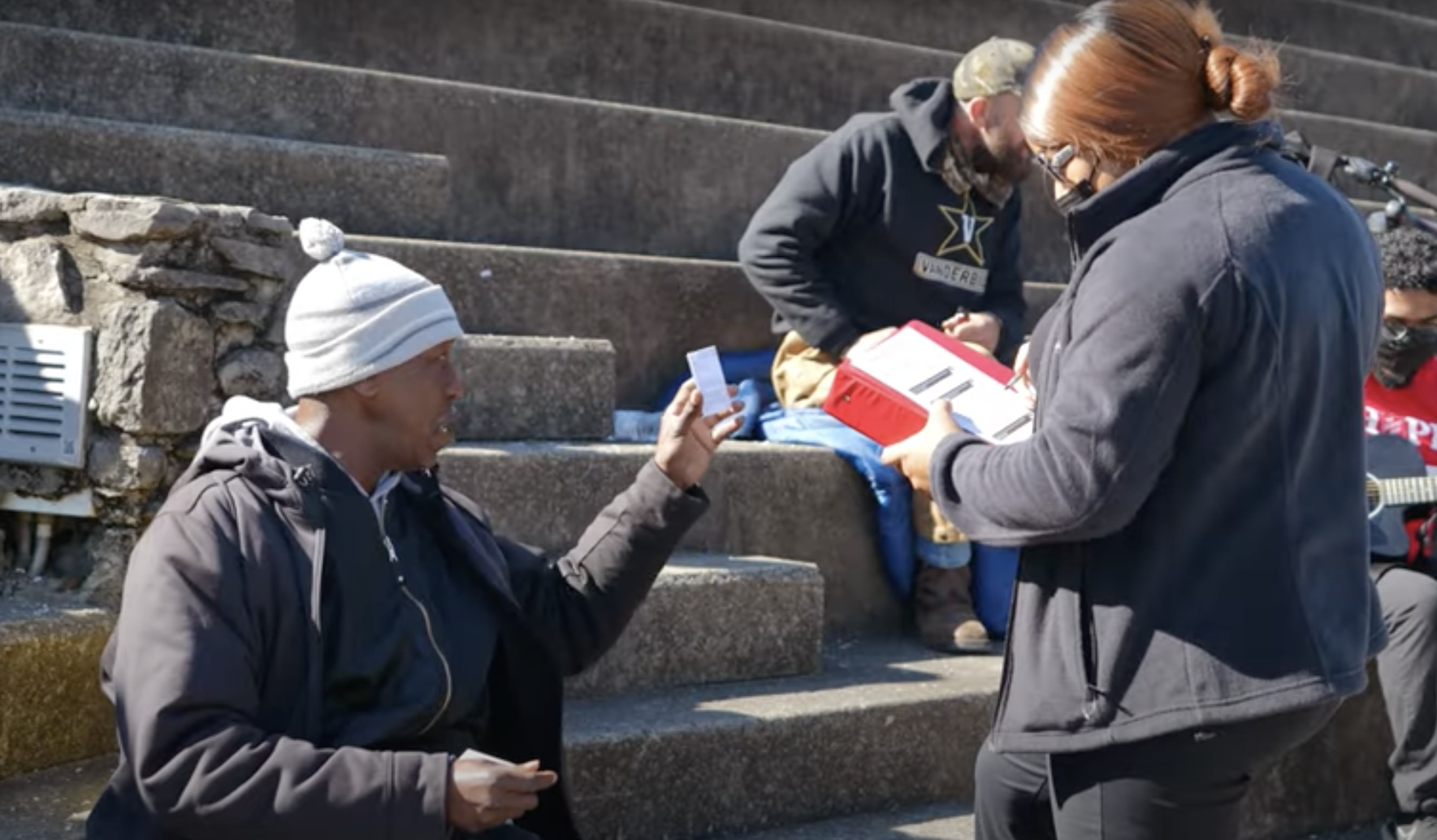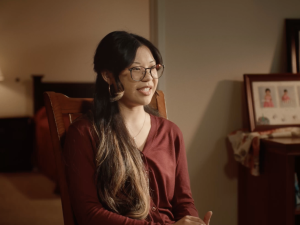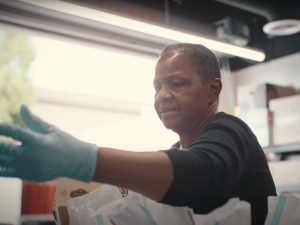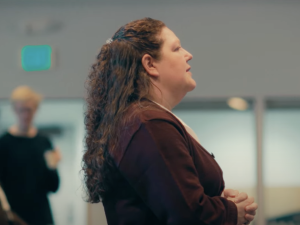In Nashville, Tennessee, The Salvation Army is experiencing tremendous success working with the homeless community. Their ‘LifNav’ street outreach prioritizes an individual’s wants and needs.
They designed an app to expedite communication with the many unhoused folks who have phones. Then they assign them an individual coach who advocates for them throughout the entire housing process.
And they’ve reached an astonishing 87% success rate with individuals they’ve moved to housing.
Below is a transcript of the video, edited for readability.
Major Ethan Frizell: Homelessness is the most biased social standing in the country. In cities with large amounts of homeless, we know that people psychologically end up seeing homeless individuals a lot like they see furniture or garbage on the curb. It creates the same brain space for them. On average, in the U.S., chronic homelessness is a 25-year death sentence. You die at age 55. What we find in the homeless service sector, housing is rarely the first goal of those that we interact with. And so we knew we had to change how we engage people, and make it not about the shelter, but about the person.
Kimberly Robinson: The LifNav program is our street outreach program, where members of our staff go out to the community and meet people anywhere that people are living, experiencing homelessness. We serve food every day. We’ll communicate with them, build relationships, and then our ultimate goal is to get them off the streets and get into housing.
Major Ethan Frizell: Just like you want an app that allows you to live your life, so do the people we serve. Try to change your cable bill, try to cancel your gym membership, or your cell phone bill. You’re going to have to call, visit the office, maybe give blood, I mean, to change your cable bill is just terrible. Now imagine that you’re tired, you’re broken, you’re hungry, you’re socially displaced, and people don’t like you.
And you need information, and they send you on a bus to a location that’s not open, for information that the last place you went to had, but you didn’t know that you needed. That happens all the time. We said, how can we get as much information as possible in the hands of those we serve?
James Harvin: The LifNav app is basically a resource hub, and also how you can get in touch with our LifNav team. So when you click on the resource tab, you’re able to find everything in the city regarding clothing, day shelters, education, food services, your SNAP benefits. So it has everything in the city that you would need, all in one place.
Major Ethan Frizell: And so by giving people a phone and giving them the app, we can send them Uber credits that give them a ride, whether it’s to work the first week in a new job, or it might be a meal to someone who’s sick.
James Harvin: The biggest thing about helping out the transient community is making sure that they don’t feel as if they’re less than.
Marquita Harvey: What you witnessed me doing was an intake. I will work on his documentations next. So him, he needed a birth certificate, and a phone. I’m going to order him a birth certificate, get all the documentation he needs, that’s going to make it easier for him to be placed in a home. When he gets picked for housing, then he moves over to a Coach, and then that Coach will take it from there.
James Harvin: Like if you get ostracized and outcast and all of these different things, it is a demoralizing thing, and it makes you feel so discouraged, so downtrodden. We want to make sure that that doesn’t happen.
Kimberly Robinson: If you have that person that you can call, during good times, during bad times, they’ve seen you at your worst, and they’re helping you through it, then it helps build that bond and build community so they know they can better integrate into community, too.
Aaron: Some of the people out here, their families don’t even care anymore, so…if you don’t have nobody that cares, it’s real easy to give up.
Cowboy: Tiffany how long I’ve been here? About six months? I’m used to having nobody. And then they step in and, “Cowboy, you need a helping hand.”
Darren: You know, she’s always checking up on me. She always makes sure I got what I need. She always want to know what’s going on with me.
Aaron: She’s more of a friend than anything, you know. I mean, she makes you feel comfortable. Not scared to ask for anything. Because at first, I wouldn’t ask for nothing, because I’m real prideful. Yeah, she’s been a godsend.
Cowboy: I think the world of Ms. Tiffany.
Darren: Just having her, just makes me want to do better, you know, to make her…to make her not feel like she’s wasting her time doing stuff like this.
Tonya: A lot of people judge, but she doesn’t judge anything.
Aaron: Yeah. People do judge. Got any more like her?
Major Ethan Frizell: On average right now, LifNav coaches take 45 days to move someone who’s assigned to us to housing. If we help 100 people move into housing, likely it will work for somewhere between 85-90, it’s about 87% right now. That means 13 people didn’t work. Sometimes people will go, “But it didn’t work with Bob,” right? And you go, that’s true, it didn’t work with Bob. But Bob is now one of 13, Bob was one of 100. It’s relationship, relationship, relationship. And I think that that’s the reason why it’s been so successful.
Homelessness should not be a life sentence, or one’s life story. It’s a circumstance. When they live in our neighborhoods, they are absolutely our neighbors, whether housed or not, and so one of the great Salvation Army quotes is, “Sometimes we have to disturb the present, in order to create the future.” And so that’s what I pray that we’re doing, so that the likelihood of them dying early, being addicted, going to jail, can be changed. And that’s the beauty of The Salvation Army, is we change lives, and in changing lives, we save lives, and doing it in the name of Jesus, not only for today, but for eternity.
Do Good:
- See more videos like this in our video feed.
- How do we treat everyone with love and kindness, as if they were our neighbor? Get the Do Good Family Roadmap and take a 4-week journey for families in how to be a good neighbor. Follow the guide to see what the Bible says about the art of neighboring and take tangible steps together on your printable roadmap to be a caring, helpful, welcoming and supportive neighbor right where you are.
- What does it mean to do good? Where can we discover joy? What is it really like to be homeless? How can I raise a kind kid? Subscribe to The Do Gooders Podcast to find these episodes and much more—all to help you be inspired to do good right where you are.











